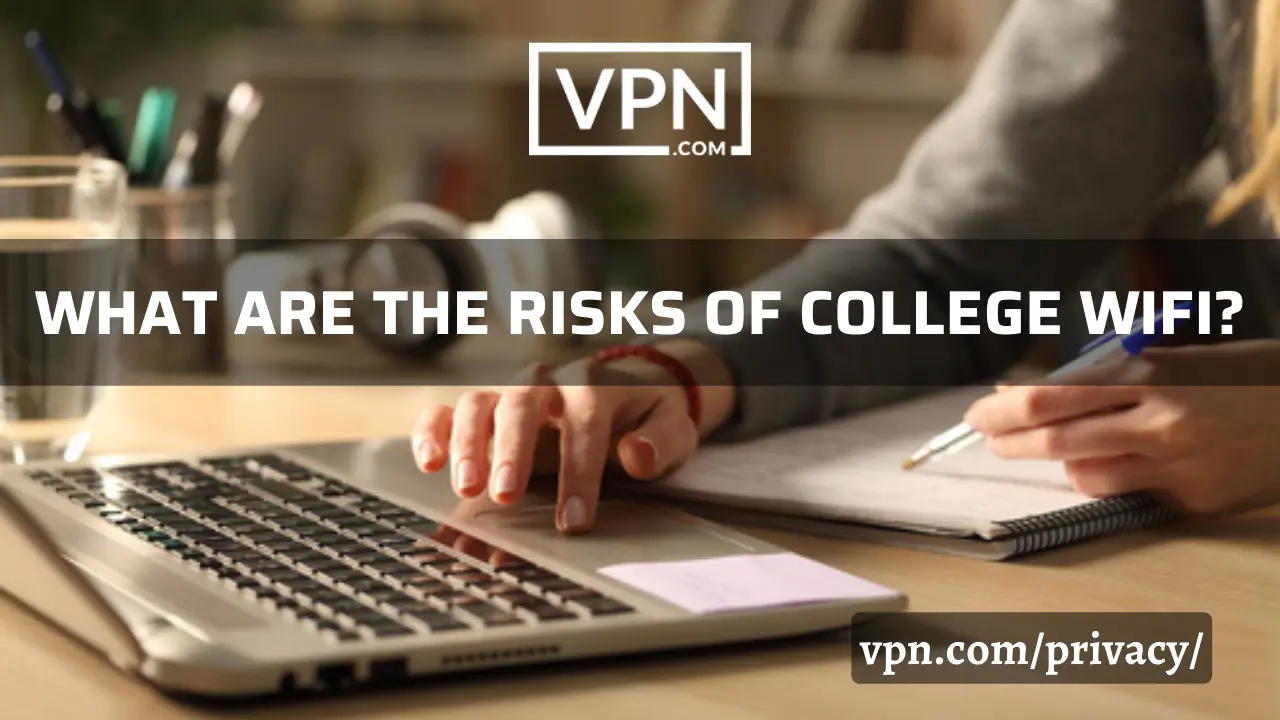Is College WiFi Safe?

There are a lot of things that new college students have to learn when they’re living on their own for the first time. You’ll have to tackle laundry, cooking ramen, and keeping your online identity secure.
Many new college students might be surprised to find that even in college, they may not be able to get away from oppressive network blocks. Even adult institutions try to control the types of content their students can see and access every day.
So what’s a budding student to do? Why use a VPN of course! Read on to find out everything a university student should know when it comes to college WiFi. We discuss potential threats/restrictions and how a VPN keeps you safe and anonymous.
What Are The Risks Of College WiFi?

The first question that needs answering is obvious. What are the threats you should be most concerned with when logging in to your college’s WiFi network?
University Monitoring Your Traffic
Students may not consider the level of control their university has over the traffic that passes through its network. Many college network administrators have begun tracking their students’ data. In most cases, it’s part of an effort to crack down on piracy and the over-consumption of pornographic material.
This sort of censorship is completely within the university’s right to enforce, especially in the case of religious universities. Every college administration can rightfully determine what type of content they want people to access on their network.
On the other hand, these measures mean there is a database of your browsing habits sitting on someone else’s server. If this sounds just a little bit more than spooky to you, using a VPN is the only way for a college student to encrypt their data.
Every college has the right to control its network. However, you also have the right to prevent snooping administrators from being able to see everything you do online.

Get Started w/ NordVPN Today
- Top-rated VPN for OS unknown
- Ultra-fast speed in US in 2024
- Save 69% off with VPN.com Discount
- Plans starting at $2.99/month
GUARANTEE
College Blocked a Website
As we mentioned in the previous section, universities have begun restricting the types of content that their students can see. The goal here is to protect both the network of the university as well as the students connected to it.
This is understandable but can be annoying for students who want to access torrenting sites, P2P portals, or adult content (which every student should be allowed to see, given that they have to be 18+ to attend college in the first place).The way a university blocks content can vary, but generally, they’ll use a mass-filtering firewall to detect particular domains, keywords, or data flags.
Once a restricted item is detected, the firewall will stop the stream before it even has a chance to start.
A VPN mitigates these techniques, putting the power to browse however you choose back in the hands of the students. No more running into Facebook blocks during your teacher’s next lecture as long as you’ve got your VPN turned on!
Hackers Utilizing Unsecured Connections
The biggest threat to students on an unsecured (or even secured) college WiFi network, however, is the same as it is for everyone else browsing the web. Between 2008 and 2010, there were over 150 breaches among the top universities in the US. These breaches resulted in the loss of over 2.3 million personal records of students.
If hackers can access sensitive student files, who’s to say it wouldn’t be just as easy for them to get into those website access logs we discussed previously? When you sign up for campus WiFi, the username and password you’re assigned are directly tied to your real identity.
Consequently, hackers could link your real name, home address, phone number, and even your report card back to any content you’ve been browsing online. Needless to say, that’s a huge issue for anyone who plans on keeping their online identity anonymous.
With so many students accessing the same network simultaneously, a college WiFi network is like one giant buffet for hackers.
According to a study released a few years back, students aged 18-24 are the largest targets for identity theft in the United States. They often take two to five times longer to realize their identity has been stolen than users in older age groups. As a result, hackers will always look at university WiFi systems as goldmines of unsecured information ripe for the taking.

Get Started w/ NordVPN
- Top-rated VPN for OS unknown
- Ultra-fast speed in US in 2024
- Save 60% off with VPN.com Discount
- Get a 30-day Money Back Guarantee
GUARANTEE
What Can You Do To Protect Yourself On College WiFi?
Use a VPN! No matter what you’re trying to access or protect yourself from, a VPN is the quickest and most effective method of securely connecting to college WiFi.
Customer Reviews for NordVPN: In-Depth Review, Tests, and Stats

Connection issues with MLB.TV
May, 2 2023

Prompt customer service
May, 6 2023

I would highly recommend
December, 15 2023

Get Started w/ NordVPN Today
- Top-rated VPN for OS unknown
- Ultra-fast speed in US in 2024
- Save 69% off with VPN.com Discount
- Plans starting at $2.99/month
GUARANTEE
